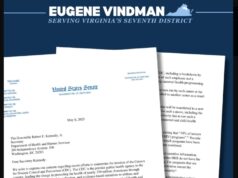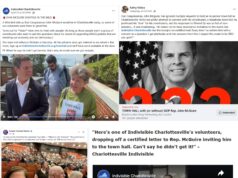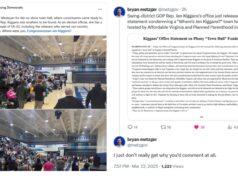 Over the past few weeks, I’ve had the chance to interview (in writing) all five Democratic candidates for Virginia’s 45th House of Delegates district. Here are my composite scores, issue by issue and candidate by candidate, with an overall grade at the bottom. Of course, there’s a lot of subjectivity to this, but I tried to rate the answers on their own merits, as well as to be internally consistent in how I rated the candidates (e.g., in terms of thoroughness, local relevance, progressive and environmental values). As you can see, there are several strong candidates for the Democratic nomnination in the 45th, which is the kind of “problem” voters should want to have!
Over the past few weeks, I’ve had the chance to interview (in writing) all five Democratic candidates for Virginia’s 45th House of Delegates district. Here are my composite scores, issue by issue and candidate by candidate, with an overall grade at the bottom. Of course, there’s a lot of subjectivity to this, but I tried to rate the answers on their own merits, as well as to be internally consistent in how I rated the candidates (e.g., in terms of thoroughness, local relevance, progressive and environmental values). As you can see, there are several strong candidates for the Democratic nomnination in the 45th, which is the kind of “problem” voters should want to have!
P.S. Also, just to emphasize, these grades are based on the candidates’ answers to the Blue Virginia questionnaire, not their debate performances, endorsements, fundraising, etc.
1. Tell us a bit about yourself, and specifically, what in your background and/or temperament makes you the best qualified of the Democratic candidates to represent the 45th House of Delegates district in Richmond.
Mark Levine: B+; lengthy and generally very strong answer, except that it doesn’t talk about any local involvement specifically in Virginia and/or the 45th district.
Clarence Tong: A-; strong background in national and local politics, including service as chair of the Alexandria Democratic Committee and as an Obama administration appointee.
Craig Fifer: A-; strong history of involvement in the Democratic Party, as a volunteer, and in his professional work.
Julie Jakopic: B+; good answer, although nothing about Democratic Party activity, volunteering on campaigns, etc.
Larry Altenburg: B; as in “business,” which seems to be his focus.
2. What three issues are you most passionate about and why? What specifically have you done to further those issues? What would be the first bill you’d introduce in the House of Delegates?
Mark Levine: A; very strong answer with detailed explanations.
Clarence Tong: A; very strong
Craig Fifer: A+; very strong and detailed answers, also very much like the focus on “effective and transparent government,” a core progressive value and something sorely needed in Virginia these days!
Julie Jakopic: A; strong focus on education and health care, and promoting economic opportunity for all, with detailed answers.
Larry Altenburg: B-/C+; solid background, mostly in business and urban planning, although nothing necessarily jumps out from a progressive or environmental perspective.
3. How would you describe yourself ideologically – “progressive,” “moderate,” “liberal,” or something else? How does your record of votes, endorsements, employment, and other activities reflect your political ideology?
Mark Levine: A; very strong answer about being a “progressive” and a “liberal.”
Clarence Tong: B; decent answer — “I am proud to call myself an Obama Democrat, although there’s certainly question – even to this day – about what it means exactly to be an “Obama Democrat” (despite the right wing’s feverish imaginings that Obama’s some sort of far-left radical, my views is that he’s a pragmatist who likes to seek consensus and bipartisan compromises).
Craig Fifer: A; good answer — “I’m a progressive” who has worked to “help elect progressive candidates and make our Party stronger and more effective.”
Julie Jakopic: A-; good answer (“results-oriented progressive”).
Larry Altenburg: C; my preferred answer to this question would have been “progressive” or “pragmatic progressive,” as I’m not sure exactly what a “pragmatic Democrat” would be in practice, given the current reality of politics in Virginia (e.g., a House of Delegates overwhelmingly controlled by hard-right Republicans).
4. Who is your favorite and who is your least favorite current Virginia politician and why?
Mark Levine: A-; very strong answer on the favorite (Mark Herring), interesting (if a bit obscure) answer on the least favorite (Phil Puckett).
Clarence Tong: B-; easy answer (Warner and Kaine), but not one that I find particularly inspiring, as Mark Warner has been basically an old-style moderate Republican, not particularly progressive on economic issues, and mediocre (at best) on energy/enviro issues.
Craig Fifer: C; didn’t directly answer the question, and while in theory I also strongly believe “that politics should be about ideas and not about personalities,” in reality that’s rarely the case.
Julie Jakopic: B; goes for the political pick on “favorite” with her long-time friend Rob Krupicka, who has endorsed her for this election; very strong answers on “least favorite,” picking two politicians who, in their own ways, have violated the public trust.
Larry Altenburg: D; didn’t directly answer the question, also used a false equivalency, criticizing any politician – progressive, conservative, libertarian, green, whatever – who is “entrenched in ideology.”
5. If you had been in the House of Delegates at the time, would you have voted for a) HB 2313, the comprehensive transportation package passed in 2013; b) repeal of Virginia’s estate tax, which is costing our state around $130 million a year in order to benefit a few hundred of the wealthiest Virginians; c) the 2011 redistricting bill HB 5001, which gerrymandered the state and helped to lock in a Republican majority in the House of Delegates for the rest of the decade; or d) the 2014 and 2015 ethics reform packages, which many (myself included) have criticized as extremely weak, possibly even a step backwards in the case of the most recent “reforms.”
Mark Levine: B; the answers are fine (although I think the transportation bill was seriously flawed and needed multiple changes), but little elaboration as to his thinking behind them.
Clarence Tong: B; the answers are fine, but no elaboration about his thinking behind the answers.
Craig Fifer: A; very strong answers and reasoning — nice job.
Julie Jakopic: B; solid answers.
Larry Altenburg: B; solid answers.
6. What is your vision for Virginia’s energy future? Do you support any of the following: offshore oil drilling, natural gas “fracking,” new natural gas pipelines (e.g., Mountain Valley Pipeline, Atlantic Coast Pipeline) uranium mining, new coal-fired power plants, mountaintop removal coal mining? If not, what will you do to fight against these things, and to fight for a healthy environment, energy efficiency, and renewable power?
Mark Levine: A; very strong answer.
Clarence Tong: A-/B+; generally strong answers, except for being open to new natural gas pipelines, although that does seem to be consistent with the position of the friendly-towards-natural-gas environmental group (Environmental Defense Fund) he works for.
Craig Fifer: A; very strong answers, as well as reasoning behind them.
Julie Jakopic: A-/B+; generally strong, although I am not a fan of her answer on natural gas pipelines (“I remain undecided about construction of major new natural gas pipelines across Virginia.”).
Larry Altenburg: B; generally strong, but didn’t answer my question about new natural gas pipelines, also left the door slightly ajar to offshore oil drilling.
7. Yes or no answers. Do you support:
a) a strongly progressive tax system, including a reasonable estate tax on the wealthy; b) “Dream Act” for Virginia; c) allowing gay couples to adopt; d) closing the “gun show loophole” and taking other commonsense gun measures; e) raising the gas tax and/or instituting a carbon tax (revenue-neutral or otherwise)?
Mark Levine: A-; very strong answers, although no elabaration at all as to his thinking on them.
Clarence Tong: A-; very strong answers, although no elabaration at all as to his thinking on them.
Craig Fifer: A+; very strong answers as well as reasoning behind the answers.
Julie Jakopic: A-; very strong answers, although not a great deal of explanation.
Larry Altenburg: C+; strong answers on most of the questions, with two important exceptions — 1) he did not endorse a “progressive tax system, including a reasonable estate tax on the wealthy” (although in another answer, he said he would NOT have voted to repeal the estate tax, which I’m glad to see!) instead calling for “a much more simple and common sense tax regime;” 2) he rejected a carbon tax, apparently even one that is revenue-neutral (e.g, all the revenues could be returned to people in a progressive manner), in favor or a cap-and-trade system, which is fine as well but no reason to reject a carbon tax.
8. Given that the 45th House of Delegates district is a solid “blue” district, and thus a “safe seat,” it is crucial that whoever is elected has a plan to help elect Democrats – preferably progressives – across Virginia. That includes fundraising, organizing volunteers, and maximizing turnout in the 45th district for statewide and Congressional elections. Do you agree with this vision for the Delegate from the 45th district, and if so, what exactly is your plan to accomplish it?
Mark Levine: B+; good answer, although the knock on Mark has been that he has NOT been focused or heavily involved locally in the 45th district, would love to hear more about that.
Clarence Tong: A; very strong answer, backed up with a track record of working to elect Democrats.
Craig Fifer: A; very strong answer, backed up by a track record of helping to elect Democrats.
Julie Jakopic: A; very strong answer, backed up by a track record of helping to elect Democrats.
Larry Altenburg: C; I found this answer confusing, not sure if he’s fully committed to working to elect more Democrats, let alone progressive Democrats.
9. Do you agree or disagree that Richmond is broken – for instance, the tremendous influence of money, lobbyists and corporations (e.g., Dominion Virginia Power, car title/payday lenders) on legislation – and needs major ethics reform? More broadly, if elected to the House of Delegates, would your general attitude be more “go along, get along” with this system or to “shake things up?” Please be as specific as possible in your answer. For instance, would you support campaign finance reform that sharply curtails the power of corporations, lobbyists, and special interests?
Mark Levine: A; excellent answer, although more of a national than Virginia-specific focus.
Clarence Tong: A; excellent answer, albeit not a great deal of elaboration.
Craig Fifer: A+; this answer was absolutely superb, he really gets it on this subject!
Julie Jakopic: C; we definitely disagree on this one, as I see Richmond as almost comically (tragicomically?) broken (e.g., a government bought-and-paid-for by big corporations like Dominion; Democrats with only 32 seats out of 100 in the House of Delegates due in large part to odd-year elections, gerrymandering and a no-limits campaign contribution system) and she says, “I would not characterize Richmond as ‘broken.'” She does support “further ethics reform” and redistricting reform, both of which are sorely needed.
Larry Altenburg: D; I respectfully, but strongly, disagree with his “both sides” false equivalency, in which (supposedly) “Richmond is broken since Democrats and Republicans aren’t working together to find solutions to our most basic problems.” I further disagree that the problem in Richmond is “partisan bickering” per se. Instead, I believe the problem is a system which is fundamentally corrupt, also one which discourages compromise, mostly these days since Republican incumbents fear a challenge from their above all else, ergo are not willing to meet anywhere near the middle.
10. Please tell us how you would stand up to party leadership, and even to a Democratic
governor, if you believed that they were wrong about an issue and/or that it would hurt the 45th district.
Mark Levine: B; solid answer (other than misspelling “McAuliffe” twice), although more focused nationally than specifically here in Virginia.
Clarence Tong: B-; there’s nothing wrong with this answer, but I’m not sure I’m specifically and convincingly hearing how he’d “stand up to party leadership, and even to a Democratic governor, if you believed that they were wrong about an issue.”
Craig Fifer: B-; there’s nothing wrong with this answer, but I’m not sure I’m specifically and convincingly hearing how he’d “stand up to party leadership, and even to a Democratic governor, if you believed that they were wrong about an issue.”
Julie Jakopic: B; I’m not sure I heard a clear answer to this question, but she certainly was willing – as she notes – to stand up Don Beyer on things she cared about, and that seems to have led to a positive outcome.
Larry Altenburg: B-; there’s nothing wrong with this answer, but I’m not sure I’m specifically and convincingly hearing how he’d “stand up to party leadership, and even to a Democratic governor, if you believed that they were wrong about an issue.”
OVERALL GRADE
Mark Levine: A-/B+
Clarence Tong: B+
Craig Fifer: A-
Julie Jakopic: B+
Larry Altenburg: C+/C



 Sign up for the Blue Virginia weekly newsletter
Sign up for the Blue Virginia weekly newsletter







